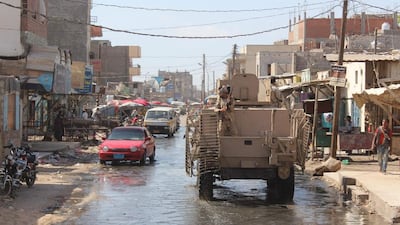Aden // Pro-government forces set up checkpoints across Mukalla on Monday and said all Al Qaeda militants had been cleared from the city where they had been based in Yemen for more than a year.
The operation to free the strategic port of half a million people was part of a larger offensive against Al Qaeda in the Arabian Peninsula and ISIL affiliates. The extremists have taken territory across the south during fighting between Yemeni forces backed by the Saudi-led coalition and Houthi rebels and their allies loyal to former president Ali Abdullah Saleh.
The checkpoints were set up inside Mukalla and at its entrances, and a 6pm to 6am curfew on vehicles was established for at least one week, said Brigadier Awadh Salmeen , commander of the tribal Al Rayan Brigade, which took part in the assault.
Al Qaeda was estimated to have at least 1,000 fighters in the city, but they mostly fled towards Shabwa province and areas in Wadi Hadramawt, Brig Salmeen said, adding that the forces were pursuing the fighters. The Al Dhaba oil port in nearby Shihr was also secured by the coalition and Yemeni forces, he added.
The pro-government forces attacked Mukalla from three directions, Brig Salmeen said – Horshyat, Dawas and Shihr. “The [coalition] air strikes helped us to enter Mukalla, in addition to the coalition ground forces, and especially from the Emirates, and these two things helped us to recapture Mukalla in a matter of hours.”
On Monday, residents of the city expressed deep relief after a year of Al Qaeda control.
During the extremist group’s rule of Mukalla, where it looted US$100 million (Dh367m) from the central bank and made up to $2m per day in “taxes” at the port, it tried to gain support by abolishing income tax and exploiting feelings of resentment by southerners. But the extremists also imposed harsh interpretations of Islamic law, banning the chewing of qat leaf, a popular mild narcotic, and forcing women to wear niqab, as well as reportedly destroying tombs of Sufi saints.
Ammar Abdul Hamid, 23, a journalist in Mukalla with the state-run radio station, said he felt freedom when he saw the military vehicles enter the city.
“During the last year I did not feel freedom, and I used to be cautious of the Al Qaeda fighters, so I thank the Yemeni army and the coalition forces that participated in the liberation of Mukalla,” he said.
Salem Al Gifri, 40, a businessman, said Al Qaeda used to impose taxes on the traders for its extremist projects. “I cannot express my happiness enough today, but the best thing is that the Al Qaeda fighters will not come to me again and force me to give them money.”
Many residents celebrated by preparing sweets and bread and distributing them to soldiers in the city.
Raneem Bawazeer, 27, a broadcaster in Salamatk Radio in Mukalla, used to walk unveiled in the streets, but when Al Qaeda took over the city, they forced her to wear a veil, she said. “This morning I threw the veil and went to my work as before, I do not need veil anymore.”
The assault on Mukalla was launched after a ceasefire with the Houthis and Saleh’s forces was agreed and peace talks between the Yemeni government and the Iran-backed rebels got under way in Kuwait.
While there has been no sign of a breakthrough and disagreements over what the talks should address first, the UN envoy mediating the negotiations said “tangible progress” had been made on Monday. “Reports indicate real improvement in the situation which reflects the parties’ commitment to the cessation of hostilities,” Ismail Ould Cheikh Ahmed said in a statement after the fifth day of talks.
As the coalition begins to shift its priorities to extremist groups, consultations between the UAE and US officials over Washington’s assistance in fighting the Yemen-based branch of Al Qaeda, or Aqap, began in February, the New York Times reported.
The US considers Aqap to be the most serious terrorist threat to the United States, and officials have had growing concerns about the group exploiting the chaos of war to consolidate its grip on territory in southern Yemen. While US counter-terrorism personnel withdrew from Yemen last year due to the war, Aqap’s leader was killed in a US drone strike near Mukalla earlier this year and Aqap bases have also been targeted by the US, including one strike last month that killed more than 70 alleged militants.
UAE special operations forces had been training southern Yemeni tribal fighters in recent weeks in preparation for the offensive, and coalition and Yemeni forces moved into a position near the city last week. There were reports Al Qaeda had been preparing defences in anticipation of the assault, but after a barrage of air strikes overnight on Saturday and a ground offensive the next morning, the militants put up little resistance.
Government sources in the city told Reuters that most of the militants withdrew before the assault after negotiations with local tribal officials who hoped to save the city from prolonged fighting. However, the Saudi-led coalition spokesperson claimed on Monday that 800 Al Qaeda fighters were killed during the assault. No civilian toll was given.
The Mukalla operation was part of a broader offensive over the past week against extremist-held towns in the south. Coalition and Yemeni forces liberated Hawta, the capital of Lahj province, and on Saturday entered Abyan’s provincial capital Zinjibar. But an Al Qaeda car bomb in the city killed seven soldiers and wounded 14, and the force pulled back to the outskirts of the town, a Yemeni military official told AFP.
foreign.desk@thenational.ae

